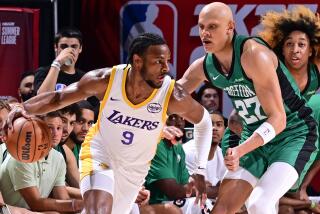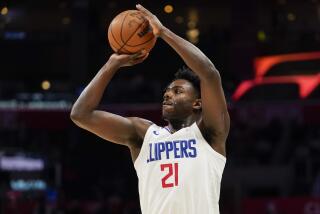Without a Uniform, Dee Brown Was Just Another Black Man
- Share via
The Boston Celtics made Jacksonville, Fla., guard Dee Brown their No.1 pick in the June draft. In an era when even unsigned rookies preen and posture and make a fuss, Dee Brown behaved like a throwback to a simpler era.
He said and did all the right things. While Brian Shaw was still treating the Celtics’ front office as if it had bubonic plague, Dee Brown said he had no intention of making the Celtics bid against Il Messaggero for his services. No off-court trickery for him.
In a gesture of good faith, Brown showed up at the Celtics’ rookie camp in July. He hadn’t given his signature to the Celtics, but he already was offering his heart.
Today, Dee Brown might wish to reconsider that offer. He might be a fine basketball player, but he is also a young black man. In a Celtics uniform, he will be a local hero, presumed innocent of all crimes and misdemeanors. But unrecognized in civilian clothes, sitting in his rental car in a lily-white neighborhood--the Boston suburb of Wellesley Hills--Brown is no local hero. He is a criminal suspect, presumed guilty by white policemen because of his color, not because of anything he has done.
Liberty and justice for all? Who’s kidding whom?
Dee Brown was minding his own business at 3:30 Friday afternoon. He was in the process of moving into a home in Wellesley. He and his fiancee were sitting in his car outside the Wellesley Hills post office, where he had rented a postal box, reading his mail.
Suddenly, they were surrounded by at least seven Wellesley policemen. Brown told the Boston Globe that it felt as if “a SWAT team was coming down” on him.
Guns were pointed. Orders were given.
The Globe said one of the officers told Brown to “drop the gun.”
Brown told the police he was holding a pen.
Brown said he was ordered to lie on his stomach on the ground and put his hands behind his back. Seems someone had robbed a local bank several days before. A secretary who had witnessed the robbery looked out the bank window and saw Brown coming out of the post office. The police said they grabbed Brown, 6-foot-1, 160 pounds, because he fit the robber’s “general description.”
An average-size young black man, in other words.
If a young white man had robbed a Boston bank, do you think police would surround the cars of all young white men sitting outside the post office reading their mail?
These things happen to innocent young black men all the time. But you only read about it when it happens to innocent young, famous black men.
When Marcus Allen joined the Raiders, he was stopped by police while driving his Ferrari within the speed limit of his upscale Los Angeles neighborhood. Allen, already a Los Angeles legend after winning the Heisman Trophy at USC, had the wrong license plates on his car.
For that, police put a gun to his head.
The Harlem Globetrotters were playing a game in Santa Barbara when police were looking for two “average-size” black men wanted for robbing a jewelry store. Police handcuffed two Globetrotters. Both were about 6-foot-8.
Shortly before ex-Cincinnati Reds star Joe Morgan was inducted into the Baseball Hall of Fame this summer, he was similarly hassled by police while using an airport pay phone. Another case of “mistaken identity.”
Say, when’s the last time you heard of a white athlete being rousted by police in a case of mistaken identity?
Brown said the incident lasted 20 minutes. He told the Globe he felt violated, “humiliated.”
“All the while, people were walking by and looking,” he said. “It makes you feel very little.”
Someday, Dee Brown may be a famous Celtic. But until he is, wouldn’t it be wise if he wore his uniform 24 hours a day?
More to Read
Go beyond the scoreboard
Get the latest on L.A.'s teams in the daily Sports Report newsletter.
You may occasionally receive promotional content from the Los Angeles Times.










